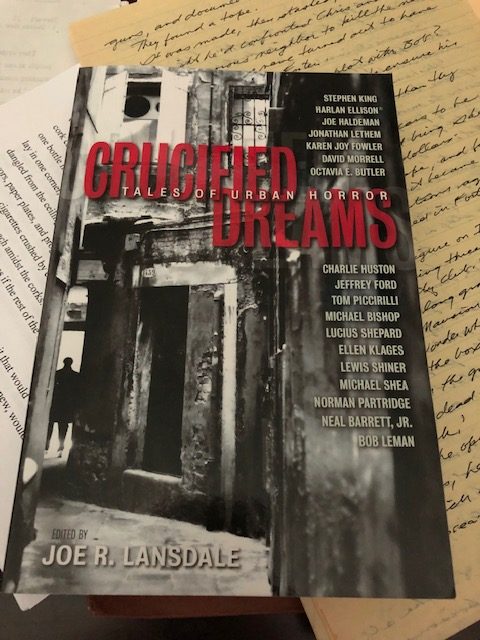Crucified Dreams:
Tales of Urban Horror
Edited by Joe R. Lansdale
Tachyon, 2011, 374pp
ISBN: 978-1-62696-003-2
$15.95, trade pb
A Review
by
Gene Stewart

Last night I re-read “Quitters, Inc.” by Stephen King, originally encountered in his first short story collection, Night Shift. It’s even better than I’d remembered, having read it years ago, in the 1970s even, back then reading for plot points most likely, whereas I read it this time paying attention to relatable character, light-footed pacing, solid structure, social commentary, thematic consistency, and other more writerly considerations. It’s not a corked bat but packs a wallop, and remains superior to others of its ilk. He follows through, he gives you enough to flesh it out, and he even ends it with a zing.
Yes, King’s story has been rendered A/V, for TV shows, and perhaps as a segment of an anthology movie, I can’t remember, but reading it is far better. The A/V version I faintly recall followed the story well, but depicting rather than imagining certain scenes makes some of the actions schlocky, hokey, or otherwise unconvincing.
I read this story in Crucified Dreams, an anthology with Joe Lansdale’s name on it as “editor”. Tachyon publisher Jacob Weisman may have ghosted a bit, is my suspicion, but who knows? The book is full of good-to-excellent stories but the title, which Lansdale explains in his haphazard introduction, was chosen simply because he and the publisher liked it from a while back. The title, which makes one expect over-the-top schlock 1950s Hollywood Horror, added to the token introduction, nearly made me skip buying, let alone reading, the anthology.
I’m glad I snagged it and kept reading.
Its title offers no clue to the range and depth of stories. There is no theme of ruined dreams to the anthology, nor is it “where dreams become nightmares” as a back-cover blurb puts it. None of that applies. In tone the stories vary from brightly untrustworthy to shadowed to pitch dark. Quality material abounds from names you’ll mostly recognize, with some famous stories, such as “The Whimper of Whipped Dogs” by Harlan Ellison, a writer Lansdale rightly cites for audacity.
This anthology offers good writing that might challenge the average reader occasionally. As an example, Jonathan Lethem’s story, “Access Fantasy”, is both a surreal science fiction story and an exercise in telegraphed endings. Its plot is mundane but presented as a single paragraph that goes on for a dozen pages. Reasons for this remain obscure; it could (should?) easily be broken into paragraphs to make it more readable. Oh, but that wouldn’t be sufficiently literary, would it? Elbow room might reveal elided explanation and plot paunch. White space aside, the story’s milieu is more interesting than its action. The title makes sense but remains coy, clever, and oblique. I liked it but thought it almost juvenile in its over-reach and execution.
Lethem being a favorite novelist of mine, I found his story, if not disappointing exactly, certainly … odd. It isn’t representative of his work in general. No reason it should be, but still. Maybe short form isn’t his forté.
Many stories surprise, both in quality and conception. Jeffrey Ford’s “Coffins On the River” for instance, which moves from Cheech & Chong stoner referents to surreal ayahuasca adventures in the shamanic dream-time, to a transformative meta-narrative of apotheosis, all in a short story, stands out in a field, probably taking a piss. Superb story, and a delightful surprise.
Ideas startle now and then. “Copping Squid” by Michael Shea offers a jaw-dropping image of a re-imagined Cthulhu, complete with re-imagined minions, that is both convincing and full of cosmic dread. Imagery is mostly not gross or grotesque throughout the stories, it’s not a gore-fest, but an occasional invisible monster leaps at the reader once it resolves. “Game Night at the Fox and Goose” By Karen Joy Fowler comes to mind. Are you lonesome tonight?
Whether to characterize this anthology as “horror” remains a quandary better resolved by ignoring it. Do labels matter? On the back of my copy it says Fantasy/Horror, as a helpful guide to shelving for the hopelessly confused bookstore stocker. Or stalker. If it’s Market Category Horror, it’s only because many of the stories are hard to categorize, and Horror is where you dump that weird stuff that doesn’t quite fit elsewhere. Can’t be science fiction, where’s all them rockets and robots? Can’t be mystery, no body in a box. How about Fantasy? Nah, no dragons or elves. Maybe it’s Literary? Don’t seem snobby enough fer dat. Mainstream, then? Well, hell, it ain’t got no fishin’ er adultery, do it?
You can find examples in Crucified Dreams to fit into Mystery, Horror, Literary, Mainstream, Science Fiction, or Fantasy. Or any other pigeonhole you crave to stuff.
“This is one good book,” Lansdale wrote in his introduction. That much is inarguable. Stories from as far back as 1973 up to 2009 are included in this 2011 anthology. It covers the years and the spread of fine writing well, even as it reminds us that good writing is where it’s found. Categories don’t matter. A good story told well is what fiction’s all about. This anthology is crammed with that kind of tale.
Anyway, check it out if you can find a copy. Worth the look, worth the price of admission, and no question worth acquainting yourself with these writers and these stories. If these are Crucified Dreams, I can’t wait for the Zombie Resurrection.
• • °

